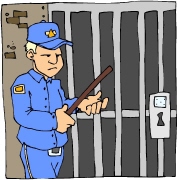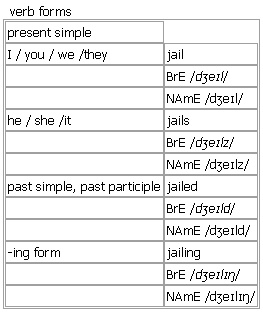|
Từ điển Oxford Advanced Learner 8th
 jail
jail

jail [jail jails jailed jailing] (BrE also gaol)noun, verb BrE [dʒeɪl] NAmE [dʒeɪl]
noun uncountable, countable
a prison
•She spent a year in jail.
•He has been released from jail.
•a ten-year jail sentence
•Britain's overcrowded jails
Word Origin:
Middle English: based on Latin cavea. The word came into English in two forms, jaiole from Old French and gayole from Anglo-Norman French gaole (surviving in the spelling gaol), originally pronounced with a hard g, as in goat.
Culture:
prisons
Britain’s system of justice relies heavily on imprisonment as a form of ↑punishment. Until the late 18th century conditions in prisons such as ↑Newgate were dirty and violent. In the 19th century conditions improved, thanks to the work of reformers like Elizabeth Fry. New prisons were built, in which most prisoners had their own cell facing into a large central area. Many of these prisons, such as ↑Pentonville and ↑Strangeways, still exist today, although Strangeways had to be rebuilt after most of the building was destroyed in riots in the 1990s.
The type of prison in which criminals serve their sentence depends on their category. Category A prisoners are considered dangerous and are held in high-security closed prisons, such as ↑Wormwood Scrubs. Prisoners may be kept in solitary confinement if they are likely to harm others. Category B and C prisoners are also held in closed prisons. Category D prisoners are trusted not to escape and are sent to low-security open prisons. Prisoners on remand (= waiting for their trial) are held in remand centres, but problems of overcrowding have resulted in many of them being kept in prisons or police stations. Young people aged 15–20 are normally sent to ↑young offender institutions, sometimes called detention centres or youth custody centres. These have replaced the old Borstals. However, if space is not available young people are sometimes sent to adult prisons. A prison is run by a governor who is responsible to the ↑Home Office, and the prisoners are guarded by warders.
There is not enough space available in prisons for the number of people being given custodial sentences. In the 1990s there were riots at several prisons because of poor conditions. Cells intended for one person often contain two or three. Despite this, some people think life in Britain’s prisons is not hard enough. Some prisons are described as ‘universities of crime’, where prisoners gain new skills in breaking the law and have access to drugs.
There are many British ↑slang expressions connected with prison. To do time is to serve a prison sentence and to have been inside means to have been in prison. Time spent in prison is porridge. Prison itself is the nick, the slammer or choky, warders are screws, and the prisoners are lags.
In the US the federal and state governments have prisons, sometimes called penitentiaries or correctional facilities. Counties and cities have jails. Federal prisons are classified as minimum, low, medium or high security. All inmates (= prisoners) who can work must do so. People are sent to a prison if their sentence is for several years. If the sentence is a year or less they are sent to jail. Some prisoners on work release are allowed to leave jail during the day to go to a job. Prisoners often spend the last few months of their sentence in a halfway house where they are helped to prepare for life outside prison.
The number of people in prisons and jails in the US is higher as a proportion of the population than in any other country. In 2002 it went above two million for the first time, twice what it was in 1990. Problems include overcrowding and the use of drugs. The fact that over 10% of African American men aged between 25 and 29 are in prison compared to 1% of white men is seen as evidence that African Americans are treated unfairly by the justice system and are more likely to be sent to prison than white Americans.
In the US people who are awaiting trial often do not go to prison but instead make bail (= pay money to the court) as a guarantee that they will return for the trial. People sent to prison as punishment rarely serve their full sentence but after some time are released on parole, which means they must report regularly to a government official. It is possible that two people who have committed the same crime may receive different punishments. To stop this happening some states have introduced mandatory sentencing, which means that the punishment for a crime is fixed by law, not decided by a judge.
Thesaurus:
jail (BrE also gaol)noun U, C
•She faces jail for child cruelty.
prison • |BrE detention centre • |AmE detention center • • penitentiary • • jailhouse • • correctional facility •
in jail/prison
in a jail/prison/detention centre/penitentiary/jailhouse/correctional facility
go to/be sent to/be released from/get out of jail/prison
Jail or prison? In British English there is little difference between these words. Prison can be used to describe the system, as well as the buildings or institution:
•the prison service/system
✗ the jail service/system In American English a jail is usually smaller than a prison.
Collocations:
Criminal justice
Breaking the law
break/violate/obey/uphold the law
be investigated/arrested/tried for a crime/a robbery/fraud
be arrested/ (especially NAmE) indicted/convicted on charges of rape/fraud/(especially US) felony charges
be arrested on suspicion of arson/robbery/shoplifting
be accused of/be charged with murder/(especially NAmE) homicide/four counts of fraud
face two charges of indecent assault
admit your guilt/liability/responsibility (for sth)
deny the allegations/claims/charges
confess to a crime
grant/be refused/be released on/skip/jump bail
The legal process
stand/await/bring sb to/come to/be on trial
take sb to/come to/settle sth out of court
face/avoid/escape prosecution
seek/retain/have the right to/be denied access to legal counsel
hold/conduct/attend/adjourn a hearing/trial
sit on/influence/persuade/convince the jury
sit/stand/appear/be put/place sb in the dock
plead guilty/not guilty to a crime
be called to/enter (BrE) the witness box
take/put sb on the stand/(NAmE) the witness stand
call/subpoena/question/cross-examine a witness
give/hear the evidence against/on behalf of sb
raise/withdraw/overrule an objection
reach a unanimous/majority verdict
return/deliver/record a verdict of not guilty/unlawful killing/accidental death
convict/acquit the defendant of the crime
secure a conviction/your acquittal
lodge/file an appeal
appeal (against)/challenge/uphold/overturn a conviction/verdict
Sentencing and punishment
pass sentence on sb
carry/face/serve a seven-year/life sentence
receive/be given the death penalty
be sentenced to ten years (in prison/jail)
carry/impose/pay a fine (of $3 000)/a penalty (of 14 years imprisonment)
be imprisoned/jailed for drug possession/fraud/murder
do/serve time/ten years
be sent to/put sb in/be released from jail/prison
be/put sb/spend X years on death row
be granted/be denied/break (your) parole
more collocations at ↑crime
Grammar Point:
school
When a school is being referred to as an institution, you do not need to use the: ▪ When do the children finish school? When you are talking about a particular building, the is used: ▪ I’ll meet you outside the school. Prison, jail, court, and church work in the same way: ▪ Her husband spent three years in prison.
note at ↑college, ↑hospital
Example Bank:
•He's gone to jail for fraud.
•His lawyer worked hard to keep him out of jail.
•How long has she been in jail?
•She avoided jail by pleading insanity.
•She could be out of jail in two years.
•There was a fire in the jail last night.
•riots at Strangeways jail
•He was held overnight at the county jail.
•He will be freed from jail automatically after serving half the term.
•Woman faces jail for animal cruelty.
verb usually passive ~ sb (for sth)
to put sb in prison
Syn: ↑imprison
•He was jailed for life for murder.
Verb forms: 
Word Origin:
Middle English: based on Latin cavea. The word came into English in two forms, jaiole from Old French and gayole from Anglo-Norman French gaole (surviving in the spelling gaol), originally pronounced with a hard g, as in goat.
Thesaurus:
jail verb T, usually passive
•He was jailed for two months.
send sb to prison • • hold • • intern • • imprison • • detain • |informal lock sb up/away • |formal incarcerate •
jail sb/send sb to prison/hold sb/intern sb/imprison sb/detain sb/lock sb up for sth
jail/hold/detain/imprison sb without trial/charge
Example Bank:
•He was jailed for murder in 1996.
•She was jailed for ten years.
•The men were convicted and jailed for life.
•One man was arrested and jailed for biting a police officer.
See also: ↑gaol
|
|
|
▼ Từ liên quan / Related words
Related search result for "jail"
|
|
